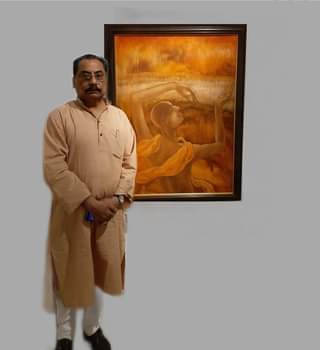Immersed in the study of the great Saint.
Some original thoughts propounded in a discussion on Chaitanya Deb for a National Programme on All India Radio (AIR) on 14th. March ’23, for which I have received many calls, including a call from the Director AIR for original thoughts.
-
Mahatma Gandhi is a confessed Vaishnav as he wrote in his autobiography. Two points he inculcated from Chaitanya Deb: Mass Prayer and the name Harijan. The significance and gradual development of the system of mass prayers evolved by him was explained by Mahatma Gandhi in one of his speeches at Sodepur Ashram in December 1945. Harijan is the name given by Mahatma Gandhi to the untouchables. Before 1932, he and his associates used the word ‘antyaja’ for untouchables. In 1932, Gandhi began a new campaign to improve the lives of the untouchables, whom he began to call ‘Harijans’, "the children of god". Both of these were influenced by Chaitanya Deb.
-
Only 'Prasad' thrown and picked up by devotees with reverence after Hari Sankirtan. This is known as ‘Harir Loot”. I used to accompany my mother to the nearest Gaudia Math to attend Hari Sankirtana. Not much effort to sing and take part, as after every verse sung you had to chant ‘Hori Bol’. At the end there was ‘Harir Loot’ or distribution of ‘batasha’, a sweet drop of jaggery which was thrown lovingly to the devotees who picked it up and accepted it with reverence. An allegory of Equality initiated by Chaitanya. Caste identity as a social institution continued over centuries. Chitanya Mahaprabhu initiated the struggle to bring change and reform in the existing society. Mahaprabhu in fact represented the aspirations of the common masses whose need was social justice and equality.
-
In Northern India the name of Ram is taken when the pall bearer carrying the dead body is taken to crematorium. In Eastern India the name of Hari is take which is a direct influence of Chaitanya Deb. Bolo Hari ! Hari Bol ! Both after the Sankirtan and the wail accompanying the corpse have the line: Hari Bol ! One Joyous and the other Ebbing. Death rites, termed antyeshti sanskars in Sanskrit, are the last of the sanskars and are considered to be the most important rites that have to be performed, in order to ensure that the departed soul can move on peacefully to whatever its next life will be. These sanskars have been observed for thousands of years by Hindus. One of the Sanskars is the Chanting of the name of God. Chaitanya adopted the chant of the name of Hari or Vishnu. Chaitanya Vaisnavism worships Krishna as the eighth avatar of Vishnu and also as the Supreme god in his own right. He is the god of protection, compassion, tenderness and love.
Could not include in discussion due to time constraint.
~ ‘Khichuri ‘, Hindi: खिचड़ी, Bengali: খিচুড়ি, was introduced as Prasad by Chaitnya. It is essentially a North Indian Dish. It is Chaitanya who introduced it as a Prasad and later went on to become one of the staple foods in Bengal. His devotees went around collecting alms of Rice, Lentils and Vegetables. The offering was collected all in one cloth sachet and then segregated for cooking of rice, dal and vegetable seperatly. On noticing this Chaitanya advised his devotees not to waste time but devote it to Hari Nam. From then it started to be cooked together, including vegetables which thus became unique to the Eastern Region. It transformed itself as the main Prasad in all Gouria Math and also in Jagganath temples.

